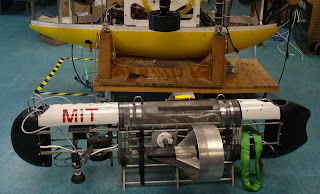
Flotation Spheres
Thursday, May 14, 2009
Posted by Ian at 11:51 AM
Labels: flotation spheres
ORCA V's Final Journey
Wednesday, May 13, 2009

DC1394 Camera Driver for MOOS
Monday, May 11, 2009
 Here is the first set of test images from the new DC1394 camera driver (and new generalized camera framework) in MOOS.
Here is the first set of test images from the new DC1394 camera driver (and new generalized camera framework) in MOOS.
The driver enumerates its implementation-specific settings as individual MOOS variables to make administration (through uMS) easier.
In this case, the brightness setting was adjusted -- arbitrarily -- from its 32 (the default) up to 127 and down to 1.
Preparing Sea Perch Kits for Maker Faire
Friday, May 8, 2009

The hardest part so far was cutting 14,000 feet of Cat 5e cable (network cable) in to 350 pieces and coiling it. The blue cables on the floor here are about 200 of those.
Posted by Ian at 4:55 PM
Labels: maker faire, sea perch
Dead Battery
Monday, May 4, 2009

After 3 years of faithful service, our battery was accidentally allowed drain far below the acceptable minimum voltage for Li-ion cells, effectively ruining its capacity. In fact, it would be unsafe to recharge this battery in its present under-voltage state.
We will have to build a new battery. This is unfortunate, but since these cells lose 20% of their capacity per year in perfect storage conditions, it was inevitable.
This will push our schedule back a bit...
Getting the Hang of 3D Printing
Friday, May 1, 2009
The Enemy

Although it looks like mucus, this animal is fairly firm, almost leathery. It's actually a large group of sea squirts -- cloned from a single individual -- tightly packed together.
We will be running some survey missions between mid-July and mid-August to learn more about where this species lives and how it is spreading.
